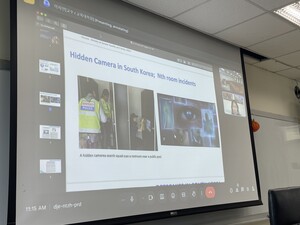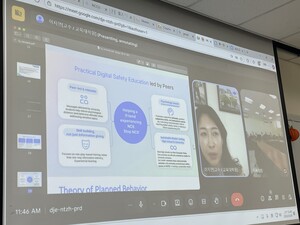Date :
2025-11-11
Department :
International Master's Program in International Communication Studies
【Article by College of Communication】
In an inspiring guest lecture on Oct. 30, Dr. Ji-Yeon Lee, Professor at Hankuk University of Foreign Studies and Dean of Student Affairs & Human Resource Development, urged audiences to confront how digital media—often praised for its openness and connectivity—has also become a space of risk, particularly for women who face persistent threats of sexual exploitation and digital abuse.
The lecture was part of the Computer-Mediated Communication course, an English-Medium Instruction (EMI) class taught by Prof. Tsung-Jen Shih at NCCU’s College of Communication. It invited students to reflect on how digital technologies can both empower people and create new risks.
Drawing from years of research and field engagement, Prof. Lee outlined how South Korea’s advanced digital landscape has paradoxically magnified gender-based harms—from hidden-camera incidents and online circulation of intimate images to the rise of AI-generated deepfakes. While deepfakes have become a recent focus of concern, Lee emphasized that they are merely one example of a broader structural issue: the gendered nature of digital violence that normalizes women’s objectification and undermines their sense of safety.
Her studies show that women’s psychological reactions to such harms are marked by anger, anxiety, and helplessness, leading many to withdraw from online participation. Recent data indicate that a large majority of South Korean women have considered disconnecting from social-media platforms altogether, fearing their personal content could be misused or manipulated. This pattern of “digital retreat” signals not only personal fear but a loss of women’s voices in the digital public sphere.
Prof. Lee also discussed how even elite academic institutions are not immune. A case at Seoul National University (SNU)—widely regarded as South Korea’s top university—revealed a student had secretly filmed female classmates and used AI tools to create sexually manipulated images. The incident highlighted that sexual exploitation and digital abuse can occur in any setting, exposing deep-seated cultural and institutional vulnerabilities.
However, Lee’s approach extends beyond identifying problems—she is equally committed to building solutions. Her work bridges communication research, technology, and psychology to design programs that empower individuals and rebuild trust. One of her major initiatives, “From Bystanders to Upstanders,” transforms students into peer educators who learn to respond constructively to digital harms. Through training modules and scenario-based learning, students gain practical skills—such as documenting incidents, reporting safely, and supporting victims—while promoting empathy and shared responsibility. Participants earn Digital Ambassador certification, recognizing their role in fostering safer online environments.
Another example is StopNCII, a collaborative international effort to combat the spread of non-consensual intimate images. The platform allows victims to upload a secure “digital fingerprint” (hash) of their content to prevent redistribution across major online services. Prof. Lee and her team study how public trust in such systems can be strengthened through transparency, user-centered design, and trauma-informed processes—ensuring that protection tools themselves do not become sources of new anxiety or exposure.
During the discussion, Prof. Tsung-Jen Shih emphasized that content moderation is not only a matter of top-down regulation through laws or platform policies. It also requires bottom-up mechanisms that raise public awareness, motivate individuals to take action, and cultivate a shared culture of digital responsibility. He noted that Prof. Lee’s work exemplifies this dual approach—combining institutional reform with grassroots empowerment to create meaningful social change.
The lecture concluded with reflections on the future of digital communication and its ethical implications. Students were encouraged to consider how empathy, design, and education can intersect to prevent harm and restore trust in digital spaces. Prof. Ji-Yeon Lee’s talk served as a reminder that the fight against digital gender violence is both technological and cultural. By combining rigorous scholarship with community action, she not only uncovers the deep roots of online exploitation but also builds concrete pathways toward safety, dignity, and agency in the digital age.



